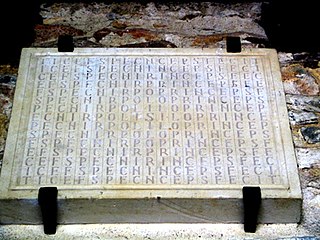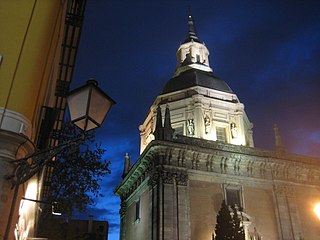
Silo was the king of Asturias from 774 to 783, succeeding Aurelius. He came to the throne upon his marriage to Adosinda, daughter of Alfonso I. He moved the capital of the Kingdom of Asturias from Cangas de Onís to Pravia, closer to the center of the kingdom. He was a contemporary of Abd al-Rahman I, Umayyad Emir of Córdoba, and of Charlemagne.

Álvaro del Portillo y Diez de Sollano was a Spanish Catholic bishop and engineer who served as the prelate of Opus Dei between 1982 and 1994.
This is a bibliography of works about Opus Dei, also known as the Prelature of the Holy Cross and Opus Dei, which was founded by Josemaría Escrivá.

Alfonso Fróilaz, called the Hunchback, was briefly the king of the unified kingdom of Asturias, Galicia and León in 925. He succeeded his father, King Fruela II, in July 925 but was driven from the throne within the year by his cousins Sancho, Alfonso IV and Ramiro II, the sons of his uncle, Ordoño II. He was restored to a royal position in part of the kingdom after Alfonso IV took power in 926, but was violently deposed and forced into a monastery in 932.
Protofeudalism is a concept in medieval history, especially the history of Spain, according to which the direct precursors of feudalism can be found in Late Antiquity.
Luis Suárez Fernández is a Spanish historian, originally a medievalist, who has extended his studies to include modern and recent history. He belongs to a line of Spanish historians that are in full agreement with Francoism and by some is named a revisionist. He carries the same name as Uruguayan football player Luis Suarez.
Diego Catalán Menéndez-Pidal was a Spanish philologist, dialectologist, folklorist, and professor of Spanish Philology.

Tomás Helmut Straka Medina, is a Venezuelan author and professor of history at the Andrés Bello Catholic University,

Sampiro (c. 956 – 1041) was a Leonese cleric, politician, and intellectual, one of the earliest chroniclers of post-conquest Spain known by name. He was also the Bishop of Astorga from 1034 or 1035 until his death.

St. Mary of Bendones is an Asturian Pre-Romanesque Roman Catholic church situated in Bendones, Spain, build between 792 and 842.
Antonio Domínguez Ortiz was a Spanish historian, one of the leading specialists in the history of the Spanish Antiguo Régimen of the 16th through 18th centuries, in particular in social history. He was also expert historian of Andalusia, with a particular emphasis on the history of the Moriscos.

The Church of San Andrés is a church in Madrid, Spain. It was declared a Bien de Interés Cultural in 1995.

Francisco Canals Vidal (1922–2009) was a Spanish philosopher, theologian, academic and lay Catholic activist. The longtime chair of Catedra de Metafísica of the Barcelona University, he is recognized mostly as one of the most distinguished contemporary Thomists and leader of the so-called Barcelona Thomist school; his scientific focus was mostly on metaphysics of cognition. As a theologian he specialized in theology of history and Josephology, as lay Catholic he contributed to devotion to the Sacred Heart of Jesus. Historian of ideas and partially political theorist himself, he remained related to the Carlist version of Traditionalism and is considered one of its greatest contemporary masters.
Francisco Javier Sánchez Cantón (1891–1971) was a Spanish art historian, who from 1960 to 1968 was Director of the Museo del Prado.

Santiago Muñoz Machado is a Spanish jurist and academic, director of the Royal Spanish Academy and the Association of Academies of the Spanish Language since 10 January 2019. As a jurist, he specialized in administrative and constitutional rights. He is also a member of the Royal Academy of Moral and Political Sciences and editor of the Diccionario del español jurídico and the Diccionario panhispánico del español jurídico.
María Teresa López Beltrán was a Spanish historian and medievalist, a professor at the University of Málaga.
Cixilo was a Visigoth queen consort, whose husband, king Egica (687–702) married her to secure his succession to the throne of Cixilo's father, Erwig.
Hildoara was a Visigoth queen consort by marriage to king Gundemar (610–612).
Pedro I el Cruel is a Spanish limited drama television series directed by Francisco Abad and written by Graciela Sáenz de Heredia about the life of Peter I of Castile, "the Cruel". It aired on TVE1 in January 1989.
Antonio Aranda Lomeña was a Spanish Roman Catholic priest, theologian, and academic.










